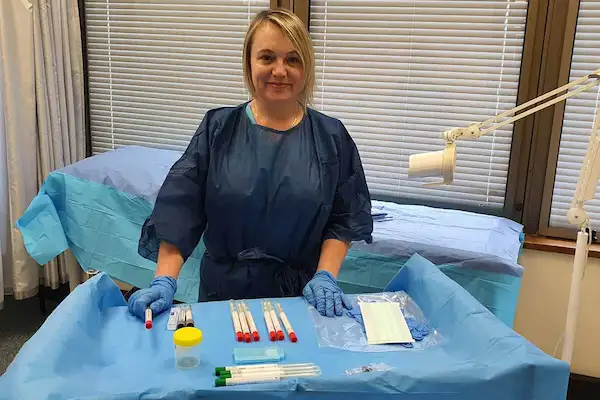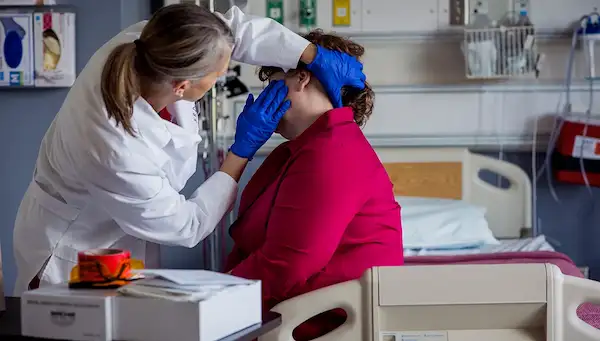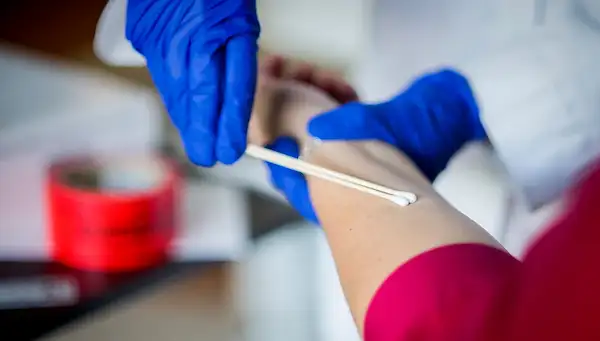Although it was only defined as a distinct field of practice in 1992, forensic nursing is now an important part of both healthcare and justice systems throughout the world. Forensic nurses provide the same high level of compassionate, scientifically informed care for patients as regular nurses. However, they are also specially trained to be able to assist in law enforcement, crime investigations and court proceedings so that justice can be done, and further violence avoided.
What is Forensic Nursing?

Forensic nurses combine nursing practice with forensic science. As advanced nurse practitioners, they carry out all of the usual duties of a nurse to a high level and often work in a hospital environment. However, they are also trained in collecting and preserving evidence of injury or assault from a victim’s body. They have a full understanding of legal protocols and are able to testify in court as expert witnesses, or to explain medical and scientific facts to a jury.
Working as part of a multidisciplinary team of both medical and legal professionals, forensic nurses help in identifying and proving cases of violent assault, injury, physical abuse and sexual assault. They are also trained in looking after the victims of these kinds of crimes, particularly in terms of the long-term psychological consequences. Survivors often suffer from post-traumatic stress disorder, clinical depression or medical complications (both physical and mental). They are also at high risk of suicide. Forensic nurses work toward the best outcomes for their patients both medically and legally.
Specialist Training
Although forensic nursing existed long before it was given a name, recognizing it as a specialist practice has meant that more facilities for training and education in forensics and legal protocols are now available for advanced nurse practitioners. Cleveland State University, a pioneer in the field, provides the fully online MSN-FN program, empowering qualified nurses to integrate forensic science with their existing expertise. This two-year, part-time course enhances their capacity to support recovery, health, and justice.
Upon qualification, forensic nurses can pursue diverse career paths such as legal nurses, consultants, death investigators, forensic psychiatric nurses, clinical forensic nurses, and correctional nurses. Their training emphasizes evidence-based practice, forensic methodologies, and a profound grasp of the legal system relevant to the specific crimes they handle. The compassionate care they apply to their patients is extended into advocacy for wider justice via the courts or changes in government policy.
A Trustworthy Profession
In civil and criminal courts, forensic nurses often advocate for truth and justice. Nursing is considered one of the most trustworthy professions, and as such the testimony of a nurse carries great weight in the courtroom. They are also experts in their field whose medical knowledge is respected.

Forensic nursing skills can be of significant help in investigating a crime. Forensic nurses can assess injuries of all types and state the probable causes, as well as the likely consequences, prognosis for recovery and treatment types. All of this information can be useful in determining the truth of what happened in a given situation.
Expert Opinion
Forensic nurses are able to provide testimonies and consultations for the justice system, alongside considered professional opinions on issues around health, injury, care and recovery, where these are relevant to a civil or criminal case. They may specialize in highly traumatic fields – for instance, in domestic violence, sexual assault, child abuse or elder mistreatment. In the US, forensic nurses can be found working in both general and psychiatric hospitals, the penal system, the offices of coroners and medical examiners, and in community anti-violence programs.
Working with Survivors
Although forensic nurses may sometimes gather evidence from the bodies of victims of violence post-mortem, most of their work is with survivors of violence, abuse or trauma. As such, they provide compassionate, informed care for their patients, and make sure that they are treated with fairness and respect both in terms of medical treatment and any legal proceedings arising from their injuries.
The support that forensic nurses give to survivors makes them far more likely to cooperate with legal investigations and prosecution. Engaging with criminal proceedings as a result of assault or abuse can be traumatic as it may involve reliving the attack, being cross-examined in court, confronting the attacker, or invasive physical examinations. Forensic nurses can provide empowering support and make sure that if any of these processes are necessary, they are carried out in a professional and compassionate manner.
Communication
Forensic nurses can sometimes act as a go-between, helping survivors and investigators establish a more effective rapport. Beyond this, they are able to communicate their findings to law enforcement more effectively than regular nurses. This leads to stronger legal cases and more successful prosecutions.

The evidence gathered by forensic nurses from a victim’s body means that police reports are more detailed and complete. As before, this leads to a stronger case. A forensic nurse’s testimony can resolve inconsistencies between different statements by outlining scientific facts. They can also explain matters that may otherwise confuse a jury – for instance, why a case of sexual assault may not result in visible injuries.
Further Evidence
The evidence and testimony provided by a forensic nurse can help detectives obtain further supplemental evidence, follow up on leads, and gain a search warrant to obtain corroborating evidence from a suspect’s body – for instance, matches of blood, hair, skin, clothing or DNA. Cases including suspect examinations are more likely to be referred to a prosecutor than those without an exam.
The body of a victim is a crime scene, but it takes a professional with both medical and forensic training to recover and document evidence effectively. Forensic nurses have the skillsets to perform these essential tasks. By working with survivors, testifying in court, and providing expert opinion and fact to investigators and juries alike, they play a vital role in ensuring that justice is done.
- SEO Powered Content & PR Distribution. Get Amplified Today.
- PlatoAiStream. Web3 Data Intelligence. Knowledge Amplified. Access Here.
- Minting the Future w Adryenn Ashley. Access Here.
- Buy and Sell Shares in PRE-IPO Companies with PREIPO®. Access Here.
- Source: https://iotworm.com/forensic-nurses-play-an-essential-role-in-law-enforcement/
- :has
- :is
- :not
- :where
- $UP
- a
- Able
- abuse
- Act
- advanced
- advocacy
- advocate
- After
- alike
- All
- alongside
- also
- an
- and
- any
- Apply
- ARE
- around
- AS
- assist
- At
- attack
- available
- avoided
- BE
- before
- being
- BEST
- between
- Beyond
- blood
- bodies
- body
- both
- but
- by
- CAN
- Capacity
- care
- Career
- carried
- carry
- case
- cases
- causes
- Changes
- child
- cleveland
- Clinical
- Clothing
- Collecting
- combine
- communicate
- Communication
- community
- complete
- Consequences
- considered
- consultants
- consultations
- COOPERATE
- course
- Court
- Courts
- Crime
- Crimes
- Criminal
- Death
- defined
- detailed
- determining
- different
- disorder
- distinct
- diverse
- dna
- document
- Domestic
- Domestic Violence
- done
- Education
- Effective
- effectively
- elder
- emphasizes
- empowering
- enforcement
- engaging
- Enhances
- ensuring
- Environment
- essential
- establish
- evidence
- exam
- existing
- expert
- expertise
- experts
- Explain
- facilities
- fact
- facts
- fairness
- far
- field
- Fields
- findings
- follow
- For
- Forensic
- forensics
- found
- from
- full
- fully
- further
- Gain
- gather
- gathered
- General
- Give
- given
- Government
- Government policy
- grasp
- great
- Hair
- handle
- happened
- Have
- Health
- help
- helping
- High
- highly
- Hospital
- hospitals
- However
- HTTPS
- identifying
- if
- important
- in
- Including
- information
- informed
- instance
- integrate
- into
- Investigations
- Investigators
- involve
- iot
- issues
- IT
- Justice
- knowledge
- Law
- law enforcement
- Leads
- Legal
- legal proceedings
- Level
- likely
- Long
- long-term
- looking
- make
- MAKES
- manner
- Matters
- max-width
- May..
- means
- meant
- medical
- mental
- methodologies
- more
- most
- multidisciplinary
- name
- necessary
- now
- Nursing
- obtain
- of
- offices
- often
- on
- ONE
- online
- only
- Opinion
- Opinions
- or
- otherwise
- out
- outcomes
- part
- particularly
- patients
- perform
- physical
- pioneer
- plato
- Plato Data Intelligence
- PlatoData
- Play
- Police
- policy
- practice
- Proceedings
- processes
- professional
- professionals
- profound
- Program
- Programs
- PROSECUTION
- protocols
- provide
- provided
- provides
- providing
- pursue
- qualification
- qualified
- recognizing
- Recover
- recovery
- referred
- regular
- relevant
- Reports
- respect
- respected
- result
- Risk
- Role
- same
- scene
- Science
- Search
- Sexual
- significant
- situation
- skills
- Skin
- So
- specialist
- specialize
- specially
- specific
- State
- statements
- stress
- stronger
- successful
- such
- Suicide
- support
- system
- Systems
- takes
- tasks
- team
- terms
- testimony
- than
- that
- The
- the world
- their
- Them
- These
- they
- this
- those
- throughout
- to
- toward
- trained
- Training
- treatment
- trustworthy
- truth
- types
- understanding
- university
- us
- via
- Victim
- victims
- visible
- vital
- Warrant
- was
- webp
- weight
- WELL
- What
- whose
- why
- wider
- with
- without
- Work
- working
- world
- worm
- zephyrnet












